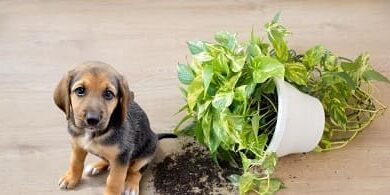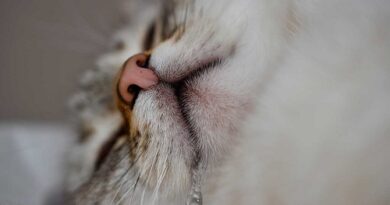Tricks so that your dog does not urinate at home
Tricks so that your dog does not urinate at home
There are many reasons why a dog can urinate inside the house and, sometimes, several causes coexist in the same animal, making it more difficult to understand and eliminate this unpleasant habit.

As with any behavioral disorder, the first step in order to deal effectively with this problem will be to analyze the reason or reasons why the dog could be urinating at home and, for this, you can always count on the help of a professional ethologist or a respectful canine educator, as well as your veterinarian. Puppies will safely urinate indoors until they are able to control their sphincter for several hours and learn to relieve themselves in the street, a goal that you will easily achieve if you start educating them from an early age. However, if your dog is an adult and has recently started to urinate indoors, it could be a consequence of stress, emotional problems, advanced age or some pathology, among other causes.
1. Reinforce him every time he urinates in the street
One of the most basic exercises to start working on modifying this behavior consists of creating a positive association between the act of urinating in the street and the arrival of a reinforcer , which can be a piece of food, a social congratulations, a caress or a moment of play, depending on what your furry likes the most.
You should offer this reinforcer only when the animal urinates in a suitable place and it has to be motivating for your dog, so don’t be shy and throw him a little party every time he pees in the street! This exercise will help your puppy to understand where he should and should not relieve himself, but it will also help you if you have an adult dog with poor hygiene habits due to lack of learning.
2. Increase the quality and frequency of walks
Walks with your dog should be quiet moments in which there is no rush and impatience. Think that these moments are special for your furry, because they are the only times of the day when he can go out to sniff, explore and interact with the environment, something essential for his emotional well-being.
The ideal is to be able to walk through large and green areas where there are not too many stressors , such as cars, children or loud noises . In this way the dog will be able to relax more easily and relieve himself without anything interrupting him. On the other hand, keep in mind that some animals need to move a little away from their guardian to be able to urinate or defecate in peace, so a leash of at least two meters will be the most appropriate.
If your dog continues to pee in the house, consider increasing the frequency of walks so you have more opportunities to reinforce when he urinates outside. Arrange to remove it at times when your dog is most likely to urinate, such as when he wakes up from a nap or shortly after eating or drinking water. These walks don’t need to be too long, especially for puppies.
3. Establish a routine
Although it seems obvious, one of the best tricks so that your dog does not urinate at home is to establish a routine and anticipate it. Highly changing and unpredictable environments can affect the emotional health of dogs and, consequently, their behavior.
Taking your dog for a walk at the same times every day helps him to create a routine and to have a greater perception of control over his environment, which is very important to prevent certain stress and anxiety problems . Letting your dog know for sure how much time is left before he can go outside to urinate will reduce the chances that he will relieve himself at home.
Of course, keep in mind that if your dog is still a puppy, he may not have the ability to endure several hours without urinating and, therefore, he will do so even if he has clearly established routines. You must adapt the schedules to the stage of development in which your furry is.
4. Reduce your stress level
Emotional disorders related to fear or stress, such as phobias or separation anxiety , can be the cause of your dog urinating in the house. In the specific case of separation anxiety (PSA), recurrent urination inside the home when the dog is alone or physically separated from its guardians is considered a symptom that the animal may be developing this disorder, along with other behaviors such as panting, crying , barking, stereotypies, nervousness , or destructive behaviors.
Unfortunately, APS is a common problem and is never solved by ignoring the animal or punishing him for urinating in the house. Its treatment must be adapted to the case of each individual and requires time and dedication on the part of the guardian, who must be involved and work constantly and empathetically with the dog.
If you suspect that your furry friend urinates at home as a result of stress or other emotional problems, you can try to help him by using special products such as canine appeasing pheromones or enriching his environment with refillable toys or chew snacks . In any case, and in these cases, we always recommend contacting a canine ethologist or educator who works positively and can advise you on how to treat your furry’s problem.
5. Clean with specific products
The areas that the animal marks with its urine acquire a different smell that invites the dog (or other dogs if there are any) to urinate in exactly the same place in the future. This is so because the pee of dogs contains pheromones that only dogs and other non-human animals are capable of detecting and the smell of these pheromones remains impregnated in the ground and in objects even if we eliminate the urine as such.
To avoid this, it is necessary to clean the areas where the dog urinates using specific products that completely eliminate the odor and therefore «erase the traces», so that not even the dog can detect it. These products are those that contain active oxygen in their composition . Neither bleach nor ammonia are effective in this case, so another trick to stop your dog from urinating at home is to use the right cleaning products.
6. Modify the value of a space
Sometimes dogs get used to urinating in a specific place in the house and only do it there, for example, in a specific room or in the corner of a specific piece of furniture. Something simple that you can try to do is to alter the value that this place has for the dog, thus making it stop being considered the «bathroom».
Dogs do not usually urinate in the same place where they eat, rest or socialize, but in more secluded areas. Start spending time with your dog in the area where he usually urinates , turning it into a play space or place his feeder, bed or other resources of interest there to modify the value that area has for him. You must complement this exercise with a good cleaning of the space and work to reinforce behavior on the street.
7. Never use punishment
You should know that dogs are not able to establish a causal relationship between two events that occur more than a few seconds apart. In practice, this means that if you get home and see a pee in the middle of the living room, it is totally absurd to punish your dog for it, because the animal may have urinated hours ago and will not be able to understand the reason for your anger . As much as he lowers his ears and rolls onto his stomach, this doesn’t mean he’s sorry, he’s just trying to calm you down.
On the other hand, yelling or scolding the dog if you catch him in the middle of the act will not be useful either, because by doing this you are not addressing the cause of the problem and, therefore, you are not solving it. The most likely in this case is that the dog becomes afraid of you and moves away from you to urinate without you seeing him or that he begins to develop other substitute behavioral problems.
8. Vet visit
If none of the tricks to prevent your dog from urinating at home work, we recommend going to the veterinary center. As in any behavioral disorder, it is necessary to rule out that the problematic behavior has appeared as a consequence of an illness or physical ailment. There are several diseases that present as one of their main symptoms polyuria (increased urine production), which can cause the dog to urinate inside the house because they cannot stand it or feel bad. Some of the most prominent are:
- urinary tract infections
- Renal disease
- canine diabetes mellitus
- Hyperadrenocorticism or Cushing’s syndrome
- Piometra
Many times these pathologies also cause polydipsia, which is defined as an increase in daily water intake. Also, if the animal is being treated for some other pathology with diuretics, this may be the cause of urination at home.
On the other hand, the age of the animal is also a factor to take into account , since very old dogs can develop urinary incontinence or the so-called cognitive dysfunction syndrome, which would be something similar to dementia in people.



